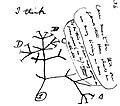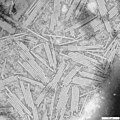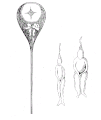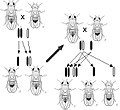Introduction
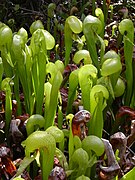

Biology is the scientific study of life. It is a natural science with a broad scope but has several unifying themes that tie it together as a single, coherent field. For instance, all organisms are made up of cells that process hereditary information encoded in genes, which can be transmitted to future generations. Another major theme is evolution, which explains the unity and diversity of life. Energy processing is also important to life as it allows organisms to move, grow, and reproduce. Finally, all organisms are able to regulate their own internal environments.
Biologists are able to study life at multiple levels of organization, from the molecular biology of a cell to the anatomy and physiology of plants and animals, and evolution of populations. Hence, there are multiple subdisciplines within biology, each defined by the nature of their research questions and the tools that they use. Like other scientists, biologists use the scientific method to make observations, pose questions, generate hypotheses, perform experiments, and form conclusions about the world around them.
Life on Earth, which emerged more than 3.7 billion years ago, is immensely diverse. Biologists have sought to study and classify the various forms of life, from prokaryotic organisms such as archaea and bacteria to eukaryotic organisms such as protists, fungi, plants, and animals. These various organisms contribute to the biodiversity of an ecosystem, where they play specialized roles in the cycling of nutrients and energy through their biophysical environment. ( Full article...)
Selected article -
Evolution is the change in the heritable characteristics of biological populations over successive generations. It occurs when evolutionary processes such as natural selection and genetic drift act on genetic variation, resulting in certain characteristics becoming more or less common within a population over successive generations. The process of evolution has given rise to biodiversity at every level of biological organisation.
The scientific theory of evolution by natural selection was conceived independently by two British naturalists, Charles Darwin and Alfred Russel Wallace, in the mid-19th century as an explanation for why organisms are adapted to their physical and biological environments. The theory was first set out in detail in Darwin's book On the Origin of Species. Evolution by natural selection is established by observable facts about living organisms: (1) more offspring are often produced than can possibly survive; (2) traits vary among individuals with respect to their morphology, physiology, and behaviour; (3) different traits confer different rates of survival and reproduction (differential fitness); and (4) traits can be passed from generation to generation ( heritability of fitness). In successive generations, members of a population are therefore more likely to be replaced by the offspring of parents with favourable characteristics for that environment. ( Full article...)Selected picture -

Major topics
Selected biography -
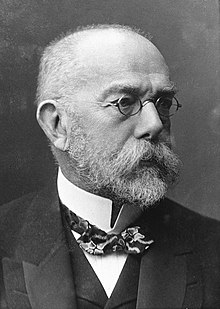
Heinrich Hermann Robert Koch (English: /kɒx/ KOKH, German: [ˈʁoːbɛʁt ˈkɔx] ⓘ; 11 December 1843 – 27 May 1910) was a German physician and microbiologist. As the discoverer of the specific causative agents of deadly infectious diseases including tuberculosis, cholera and anthrax, he is regarded as one of the main founders of modern bacteriology. As such he is popularly nicknamed the father of microbiology (with Louis Pasteur), and as the father of medical bacteriology. His discovery of the anthrax bacterium ( Bacillus anthracis) in 1876 is considered as the birth of modern bacteriology. Koch used his discoveries to establish that germs "could cause a specific disease" and directly provided proofs for the germ theory of diseases, therefore creating the scientific basis of public health, saving millions of lives. For his life's work Koch is seen as one of the founders of modern medicine.
While working as a private physician, Koch developed many innovative techniques in microbiology. He was the first to use the oil immersion lens, condenser, and microphotography in microscopy. His invention of the bacterial culture method using agar and glass plates (later developed as the Petri dish by his assistant Julius Richard Petri) made him the first to grow bacteria in the laboratory. In appreciation of his work, he was appointed to government advisor at the Imperial Health Office in 1880, promoted to a senior executive position (Geheimer Regierungsrat) in 1882, Director of Hygienic Institute and Chair (Professor of hygiene) of the Faculty of Medicine at Berlin University in 1885, and the Royal Prussian Institute for Infectious Diseases (later renamed Robert Koch Institute after his death) in 1891. ( Full article...)General images -
Did you know -

- ... that the p19 protein (dimer pictured) evolved in an arms race between plants and viruses?
- ...that there are about a million nephrons in a human kidney?
- ... that the semi-aquatic grasshopper Cornops aquaticum is being trialled in South Africa as a biological control agent for the invasive water hyacinth?
Things you can do
Related portals
Biology portals
Categories

Anatomy - Anthropology - Astrobiology - Biochemistry - Bioengineering - Bioinformatics - Biotechnology - Botany - Cell biology - Conservation biology - Developmental biology - Ecology - Environmental science - Evolutionary biology - Genetics - Mathematical biology - Medicine - Microbiology - Immunology - Molecular biology - Mycology - Neuroscience - Paleontology - Palynology Parasitology - Pharmacology -
Phylogenetics - Physiology - Systems biology - Taxonomy - Toxicology - Virology - ZoologyMore topics
WikiProjects

WikiProjects connected with biology:
A complete list of scientific WikiProjects can be found here. See also Wikispecies, a Wikimedia project dedicated to classification of biological species.
Associated Wikimedia
The following Wikimedia Foundation sister projects provide more on this subject:
-
Commons
Free media repository -
Wikibooks
Free textbooks and manuals -
Wikidata
Free knowledge base -
Wikinews
Free-content news -
Wikiquote
Collection of quotations -
Wikisource
Free-content library -
Wikiversity
Free learning tools -
Wiktionary
Dictionary and thesaurus






